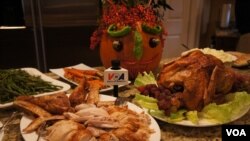MC: ວີໂອເອ ພາກພາສາລາວ ຮ່ວມກັບສະຖານີວິທະຍຸແຫ່ງຊາດລາວ ພູມໃຈສະເໜີ
ບົດຮຽນພາສາອັງກິດ GoEnglish.Me ຊຶ່ງເປັນບົດສົນທະນາພາສາອັງກິດ ກັບພາສາ
ລາວ ລະຫວ່າງອາຈານຄົນອາເມຣິກັນ ກັບລູກສິດ ຄົນລາວອາເມຣິກັນ ເພື່ອອະທິບາຍ
ຄໍາສັບ ແລະສໍານວນຕ່າງໆ.
LESSON ONE: Food: Advanced
MC: ສະບາຍດີ ທ່ານຜູ້ຟັງທີ່ເຄົາລົບ. ຂໍຕ້ອນຮັບເຂົ້າສູ່ລາຍການຮຽນພາສາອັງກິດ GoEnglish.Me ຂອງວີໂອເອພາກພາສາລາວ ແລະສະຖານີວິທະຍຸແຫ່ງຊາດລາວ. ມື້ນີ້ ເຮົາຈະພາທ່ານຮຽນຕອນສຸດທ້າຍ ຂອງບົດຮຽນ Food ຫລືອາຫານ ຊຶ່ງໃນຕອນນີ້ Winnie ຜູ້ດໍາເນີນລາຍການ ກັບ Professor Bowman ຈະພາທ່ານໄປຟັງບົດສົນທະນາ
ລະຫວ່າງ Doug ກັບ Liz ແລະໝູ່ອີກຄົນນຶ່ງ ທີ່ເຂົາເຈົ້າເຊີນໄປກິນເຂົ້າຢູ່ບ້ານ. ເຊີນເຂົ້າສູ່ລາຍການໄດ້ເລີຍ.
MC: Today we’re learning some advanced words for talking about food at a dinner party. ມື້ນີ້ ເຮົາຈະພາທ່ານຮຽນຄຳສັບລະດັບກ້າວໜ້າ ຈຳນວນນຶ່ງ ທີ່ໃຊ້ເວລາລົມກັນ ກ່ຽວກັບອາຫານ ຢູ່ງານລ້ຽງອາຫານຄ່ຳ.
Professor: Today Robert is going over to Liz and Doug’s apartment for a dinner party, ມື້ນີ້ ຣໍເບີຕ ໄປງານລ້ຽງອາຫານຄ່ຳ ຢູ່ອາພາດທະເມັນຂອງ ລີສ ກັບດັ໊ກ but he is about to find out that his tastes in food are very different from theirs ແຕ່ລາວກຳລັງຈະພົບວ່າ ລົດສະນິຍົມເລື້ອງອາຫານຂອງລາວ ແມ່ນແຕກຕ່າງຈາກຂອງເຂົາເຈົ້າຫລາຍ.
[Doorbell, door opening]
Robert: Hey Doug! Hey Liz! Thank you so much for inviting me over for dinner.
Liz: Oh, it’s our pleasure! We haven’t had company in a long time so we’re really excited you could make it. Hey, what’s that dish you brought?
Robert: Well, Doug told me we were going to have a potluck dinner, so I cooked up some of my famous steak and brought it over. I hope you like it.
Liz: Oh my gosh Doug! He brought a dead animal into our house! What are we going to do?
Robert: Uh … Doug? What’s the problem? Doesn’t Liz like steak?
Doug: Jeez … I totally forgot to tell you. Liz is a vegetarian because she thinks eating meat is like murdering animals. Don’t worry honey, tomorrow I’ll take the steak outside and bury it.
MC: Oh, Liz is a “vegetarian” because she thinks eating meat is murder, ໂອ້ ລີສກິນເຈ a “vegetarian” v-e-g-e-t-a-r-i-a-n “vegetarian” ເພາະລາວຄິດວ່າ ກິນຊີ້ນຄືກັບຂ້າສັດ so she was upset when Robert brought over a steak ສະນັ້ນ ລາວກໍເລີຍບໍ່ດີໃຈ ເວລາ ຣໍເບີຕ ເອົາສະເຕກມາ. Luckily Doug says he will give it a burial in the backyard. ໂຊກດີ ທີ່ດັ໊ກເວົ້າວ່າ ລາວຈະເອົາມັນໄປຝັງໄວ້ ຢູ່ເດິ່ນຫລັງບ້ານ.
Professor: Exactly, Winnie. ຖືກຕ້ອງ ວິນນີ່. And did you hear Liz talk about “having company”? ແລະເຈົ້າໄດ້ຍິນລີສ ເວົ້າວ່າ ເຂົາເຈົ້າມີ company ບໍ່? When you have company, that means you invite guests over to your house. ເວລາເຈົ້າມີ company ມັນໝາຍຄວາມວ່າ ເຈົ້າເຊີນແຂກມາເຮືອນ. For example, “I can’t go to the movies on Friday night because I’m having company.” ໂຕຢ່າງ ປະໂຫຍກນີ້ “ຂ້ອຍໄປເບິ່ງຮູບເງົາບໍ່ໄດ້ດອກ ວັນສຸກນີ່ ເພາະວ່າ ຂ້ອຍມີ company.”
MC: Oh OK, in Lao we say ມີແຂກ. But Professor, what is a “potluck dinner”? ແຕ່ວ່າ ອາຈານ “potluck dinner” ແມ່ນຫຍັງ?
Professor: At some dinner parties the host prepares all the food for the guests. ຢູ່ງານລ້ຽງອາຫານຄ່ຳບາງແຫ່ງ ເຈົ້າພາບຈະເປັນຜູ້ກຽມອາຫານທັງໝົດໃຫ້ແຂກ. But at a potluck dinner, all the guests each bring a dish to share with the other guests. ແຕ່ຢູ່ງານລ້ຽງອາຫານຄ່ຳ ແບບ “potluck” ພວກແຂກຈະພາກັນເອົາອາຫານມາຄົນລະຢ່າງ ເພື່ອແບ່ງປັນກັນກິນ.
MC: Oh we say ກິນເຂົ້າສາມັກຄີກັນ! That’s why Robert brought the steak. ສົມພໍ ຣໍເບິດຈຶ່ງເອົາສະເຕກມາ. ເອົາ ໄປຟັງບົດສົນທະນາມື້ນີ້ອີກ ພ້ອມກັບຄຳແປ.
Robert: Hey Doug! Hey Liz! Thank you so much for inviting me over for dinner. ສະບາຍດີ ດັ໊ກ! ສະບາຍດີ ລີສ! ຂອບໃຈຫລາຍໆ ທີ່ເຊີນຂ້ອຍມາກິນເຂົ້າແລງ.
Liz: Oh, it’s our pleasure! We haven’t had company in a long time so we’re really excited you could make it. ໂອ ພວກເຮົາຍິນດີ! ພວກເຮົາບໍ່ໄດ້ມີແຂກ ມາດົນເຕີບແລ້ວ ຈຶ່ງຕື່ນເຕ້ນອີ່ຫລີ ທີ່ເຈົ້າມາໄດ້. Hey, what’s that dish you brought? ອ້າວ ແມ່ນອາຫານຫຍັງຫັ້ນ ທີ່ເຈົ້າເອົາມາ?
Robert: Well, Doug told me we were going to have a potluck dinner, ເອີ.. ດັ້ກບອກຂ້ອຍວ່າ ພວກເຮົາຈະມີ ກິນເຂົ້າແລງສາມັກຄີກັນ so I cooked up some of my famous steak and brought it over ຂ້ອຍກໍເລີຍເຮັດສະເຕກແຊບໆຂອງຂ້ອຍມາ. I hope you like it. ຂ້ອຍຫວັງວ່າ ເຈົ້າຈະມັກ.
Liz: Oh my gosh Doug! He brought a dead animal into our house! What are we going to do? ໂອ້ຍ ຕາຍແລ້ວ ດັ໊ກ! ລາວເອົາສັດຕາຍ ເຂົ້າມາເຮືອນເຮົາ! ເຮົາຈະເຮັດແນວໃດແລ້ວນີ່?
Robert: Uh … Doug? What’s the problem? Doesn’t Liz like steak? ຮຶ...ແມ່ນຫຍັງເກາະດັ໊ກ? ມີບັນຫາຫຍັງວະ? ລີສບໍ່ມັກສະເຕກວະ?
Doug: Jeez … I totally forgot to tell you. ເອີ່ ຂ້ອຍລືມບອກເຈົ້າ. Liz is a vegetarian because she thinks eating meat is like murdering animals. ລີສ ລາວກິນເຈ ເພາະລາວຄິດວ່າ ການກິນຊີ້ນ ຄືກັນຄາດຕະກຳສັດຫັ້ນແຫລະ. Don’t worry honey, tomorrow I’ll take the steak outside and bury it. ບໍ່ຕ້ອງຫ່ວງ ທີ່ຮັກ ມື້ອື່ນ ຂ້ອຍຈະເອົາສະເຕກອອກໄປນອກ ແລ້ວຝັງມັນດອກ.
Doug: Don’t worry Robert! Even though we can’t eat the steak, we’ve got lots of other good stuff to eat. Come and sit down at the table.
Robert: Great! I’m starving. What are we having?
Liz: I really hope you like it! I’ve prepared a three-course meal for you. For our appetizer we’re having carrots, for the entrée we’re having chicken, and for the desert we’re having chocolate cake.
Robert: Well that sounds great … but did you say we’re having chicken for the main course? I thought you didn’t eat meat!
Liz: Oh don’t be ridiculous! It’s not real chicken. It’s fake chicken, made from tofu.
Robert: Doug, did she say we’re having fake chicken made from tofu?
Doug: That’s right. Trust me, it sounds pretty weird, but I’m sure you’re going to love it.
MC: Wait a minute Professor, ບຸດນຶ່ງ ອາຈານ. I’m a little confused. ຂ້ອຍຮູ້ສຶກງົງໜ້ອຍນຶ່ງ. What is a “three-course meal”? A “three-course meal” ແມ່ນຫຍັງ?
Professor: When you go to dinner in America, each dish is served one after another. ເວລາເຈົ້າໄປກິນເຂົ້າແລງ ຢູ່ອາເມຣິກາ ເຂົາເຈົ້າຈະເສີບອາຫານ ເທື່ອລະຈານ. Each dish is called a “course,” ອາຫານແຕ່ລະຈານ ເອີ້ນວ່າ a “course,” c-o-u-r-s-e ຫລືລາຍການນຶ່ງ, so if there is a three-course meal, ສະນັ້ນ ຖ້າເປັນ meal ຫລື ຄາບເຂົ້າ ທີ່ມີສາມ course ຫລື ສາມລາຍການ, that means three dishes are being served, ກໍໝາຍຄວາມວ່າ ມີການເສີບອາຫານ ສາມຢ່າງ and they are an appetizer, entrée, and dessert. ແລະອາຫານສາມຢ່າງນັ້ນ ກໍຄື appetizer ຂອງແກ້ມ, entrée ອາຫານຈານຫລັກ, ກັບ dessert ຂອງຫວານ.
MC: OK, I get it. ໂອເຄ ຂ້ອຍເຂົ້າໃຈແລ້ວ. Liz says that she made chicken for the “entrée,” ລີສ ກ່າວວ່າ ລາວເຮັດໄກ່ ເປັນອາຫານຈານຫລັກ, but it turns out that it is fake chicken made from tofu. ແຕ່ປະກົດວ່າ ມັນເປັນໄກ່ປອມ ທີ່ເຮັດຈາກເຕົາຮູ້. I bet it tastes awful! ຂ້ອຍພະນັນວ່າ ລົດຊາດມັນຄົງຈະກິນບໍ່ລົງ!
Professor: Well now they have finished eating, so let’s see what Robert thought. ເອົາ ບັດນີ້ ເຂົາເຈົ້າກິນອີ່ມແລ້ວ ໄປຟັງເບິ່ງວ່າ ຣໍເບີຕຄິດແນວໃດ?
MC: ແຕ່ໄປຟັງບົດສົນທະນາມື້ກີ້ນີ້ອີກເທື່ອນຶ່ງ ພ້ອມກັບຄຳແປ:
Doug: Don’t worry Robert! ບໍ່ຕ້ອງເປັນຫ່ວງ ຣໍເບີຕ! Even though we can’t eat the steak, ເຖິງແມ່ນເຮົາຈະກິນສະເຕກບໍ່ໄດ້ we’ve got lots of other good stuff to eat. ແຕ່ເຮົາກໍມີອາຫານອື່ນ ທີ່ແຊບໆກິນ. Come and sit down at the table. ມາ ມານັ່ງໂຕະພີ້.
Robert: Great! I’m starving. What are we having? ດີເລີດ. ຂ້ອຍຫິວແທ້ໆ. ມີຫຍັງກິນມື້ນີ້?
Liz: I really hope you like it! ຂ້ອຍຫວັງອີ່ຫລີວ່າ ເຈົ້າຈະມັກ. I’ve prepared a three-course meal for you. ຂ້ອຍເຮັດອາຫານ ທີ່ມີສາມລາຍການ ສຳຫລັບເຈົ້າ. For our appetizer we’re having carrots, ສຳຫລັບ ຂອງແກ້ມ ເຮົາຈະກິນກາຣົດກັນ for the entrée we’re having chicken, ສຳຫລັບອາຫານຈານຫລັກ ເຮົາຈະກິນໄກ່ and for the dessert we’re having chocolate cake ແລະສຳຫລັບຂອງຫວານ ເຮົາຈະກິນເຄັກຊອກໂກແລັຕ.
Robert: Well that sounds great … ໂຮ້... ຟັງເບິ່ງ ເປັນຕາແຊບແທ້ໆ but did you say we’re having chicken for the main course? ແຕ່ເຈົ້າເວົ້າວ່າ ພວກເຮົາຈະກິນໄກ່ ເປັນອາຫານຫລັກຊັ້ນວະ? I thought you didn’t eat meat! ຂ້ອຍຄິດວ່າ ເຈົ້າບໍ່ກິນຊີ້ນ!
Liz: Oh don’t be ridiculous! It’s not real chicken. It’s fake chicken, made from tofu. ໂອ໋...ຢ່າສຸຕະລົກຫລາຍ! ມັນບໍ່ແມ່ນໄກ່ແທ້ ແມ່ນໄກ່ປອມ ທີ່ເຮັດຈາກເຕົາຮູ້.
Robert: Doug, did she say we’re having fake chicken made from tofu? ດັ໊ກ ລາວເວົ້າວ່າ ພວກເຮົາຈະກິນໄກ່ປອມ ທີ່ເຮັດຈາກເຕົາຮູ້ວະ?
Doug: That’s right. ແມ່ນແລ້ວ. Trust me, it sounds pretty weird, ເຊື່ອຂ້ອຍນີ່ ມັນຟັງແປກປະຫລາດສົມຄວນ but I’m sure you’re going to love it. ແຕ່ຂ້ອຍແນ່ໃຈວ່າ ເຈົ້າຈະມັກ.
Liz: So Robert, how did you enjoy your meal? It looks like you barely touched any of your chicken.
Robert: It was … umm … interesting. It’s just that I’m not feeling so well. I think tofu chicken might be an acquired taste.
Doug: Believe me buddy, that’s what I said when I first had it. But I’m telling you, once you get used to it you’ll never go back to eating real chicken.
Liz: You know Doug, if tofu chicken really is an acquired taste, we should just put the leftovers in a doggie bag to give to Robert to take home. Then he can keep eating it all week!
MC: Professor, what is an “acquired taste? ອາຈານ “acquired taste” ແປວ່າ ຫຍັງ?
Professor: It means a preference that is only acquired after a considerable experience. ມັນໝາຍເຖິງ ຄວາມມັກທີ່ໄດ້ມາ ຫລັງຈາກໄດ້ທົດລອງຫລາຍໆເທື່ອ.
MC: Meaning you have to eat it many times and get used to it? ແປວ່າ ເຈົ້າຕ້ອງກິນເລື້ອຍໆ ເພື່ອໃຫ້ລື້ງ ແມ່ນວະ? Robert sure is a good dinner guest. ຣໍເບີຕ ຈັ່ງແມ່ນເປັນແຂກອາຫານຄ່ຳ ທີ່ດີເນາະ. Even though the chicken made him sick, ເຖິງແມ່ນໄກ່ເຮັດໃຫ້ລາວບໍ່ສະບາຍ ປວດຮາກ he just says it’s an “acquired taste.” ລາວກໍພຽງແຕ່ເວົ້າວ່າ ມັນເປັນລົດຊາດ ທີ່ຈະຕ້ອງໄດ້ກິນເລື້ອຍໆ ຈຶ່ງຈະມັກ.
Professor: That’s right but Liz offered to let him take the leftovers home so that he would fall in love with it someday. ແມ່ນແລ້ວ ແຕ່ລີສກໍສະເໜີໃຫ້ລາວເອົາອາຫານເຫລືອ ເມືອກິນອີກຢູ່ເຮືອນ ເພື່ອວ່າລາວຈະໄດ້ລື້ງກັບລົດຊາດຂອງມັນ ແລະມັກກິນມັນ ໃນມື້ໃດມື້ນຶ່ງ.
MC: ບັດນີ້ ໄປຟັງບົດສົນທະນາມື້ກີ້ອີກເທື່ອນຶ່ງ ພ້ອມກັບຄຳແປ:
Liz: So Robert, how did you enjoy your meal? It looks like you barely touched any of your chicken. ປານແນວໃດ ຣໍເບີຕ ເຈົ້າມັກອາຫານບໍ່? ເບິ່ງຄືວ່າ ເຈົ້າບໍ່ໄດ້ແຕະຕ້ອງ ໄກ່ເລີຍ.
Robert: It was … umm … interesting. ຮຶ່ມ...ມັນກະ...ໜ້າສົນໃຈຢູ່. It’s just that I’m not feeling so well. ພຽງແຕ່ວ່າ ຂ້ອຍຮູ້ສຶກບໍ່ສະບາຍປານໃດ. I think tofu chicken might be an acquired taste. ຂ້ອຍຄິດວ່າ ໄກ່ເຕົາຮູ້ອາດຈະເປັນລົດຊາດ
ທີ່ຕ້ອງໄດ້ຊີມເລື້ອຍໆ ຈຶ່ງຈະລື້ງກິນແລະມັກ.
Doug: Believe me buddy, ເຊື່ອຂ້ອຍນີ່ ສະຫາຍ that’s what I said when I first had it ຂ້ອຍກໍເວົ້າແບບນັ້ນແຫລະ ຕອນທີ່ຂ້ອຍກິນມັນເທື່ອທຳອິດ. But I’m telling you, once you get used to it ແຕ່ຂ້ອຍຂໍບອກເຈົ້າວ່າ ເວລາໃດເຈົ້າລື້ງກິນ ມັນແລ້ວ you’ll never go back to eating real chicken ເຈົ້າກໍຈະບໍ່ກັບຄືນໄປກິນ ໄກ່ແທ້ ອີກຈັກເທື່ອ.
Liz: You know Doug, if tofu chicken really is an acquired taste, ເຈົ້າຮູ້ບໍ່ ດັ໊ກ ຖ້າຫາກວ່າໄກ່ເຕົາຮູ້ ເປັນລົດຊາດທີ່ຈະຕ້ອງໄດ້ຮຽນມັກແທ້ໆແລ້ວ we should just put the leftovers in a doggie bag to give to Robert to take home. ເຮົາກໍຄວນເອົາໄກ່ທີ່ເຫລືອ ໃສ່ຖົງນ້ອຍໃຫ້ຣໍເບີຕ ເທົ່ານັ້ນແຫລະ ເພື່ອໃຫ້ລາວເອົາເມືອກິນຢູ່ເຮືອນ.
Then he can keep eating it all week! ລາວຈະໄດ້ກິນມັນເລື້ອຍໆ ຕະຫລອດອາທິດພຸ້ນແຫລະ.
MC: ນ້ອງໆນັກສຶກສາທີ່ຮັກແພງ ເວລາເຮົາຍັງມີເຫລືອຢູ່. ສະນັ້ນ ເຮົາຂໍແຖມທ້າຍດ້ວຍບົດຮຽນ English in a Minute ຫລື ຮຽນສຳນວນພາສາອັງກິດໃນນຶ່ງນາທີ. ນ້ອງໆເຄີຍສັງເກດເຫັນເດືອນສີຟ້າບໍ່? ມີສຳນວນພາສາອັງກິດ ສຳນວນນຶ່ງທີ່ເວົ້າເຖິງເດືອນສີຟ້າ ຄືສຳນວນ Once in a blue moon. ໄປຟັງກັນເບິ່ງວ່າ ມັນມີຄວາມໝາຍແນວໃດ ພ້ອມກັບຄຳແປ:
Welcome to English in a Minute, where we teach you all about idioms in American English.
Have you ever heard the American English idiom…… ທ່ານເຄີຍໄດ້ຍິນສໍານວນພາສາອັງກິດອາເມຣິກັນປະໂຫຍກນີ້ບໍ່?
Once in a blue moon.
It doesn’t mean that the moon is blue. ມັນບໍ່ໄດ້ໝາຍຄວາມວ່າ ເດືອນເປັນສີຟ້າດອກ
So let’s listen to this American English conversation to find out how it is used: ສະນັ້ນ ໄປຟັງບົດສົນທະນາພາສາອັງກິດອາເມຣິກັນບົດນີ້ເບິ່ງເພື່ອໃຫ້ເຂົ້າໃຈວ່າ ສໍານວນນີ້ໃຊ້ແບບໃດ:
Where did you say your brother lives? ເຈົ້າເວົ້າວ່າ ອ້າຍ(ຫລືນ້ອງຊາຍ)ຂອງເຈົ້າ ດໍາລົງຊີວິດຢູ່ໃສເກາະ?
He lives all the way in Minnesota, so I never get to see him. ລາວຢູ່ລັດມິນນີໂຊຕາພຸ້ນ ສະນັ້ນ ຂ້ອຍຈຶ່ງບໍ່ເຫັນລາວຈັກເທື່ອ.
I only get to see him once in a blue moon. ຂ້ອຍເຫັນລາວ once in a blue moon ເທົ່ານັ້ນ.
Once in a blue moon is a common way of saying that something does not happen often. Once in a blue moon ເປັນສໍານວນ ທີ່ໃຊ້ກັນທົ່ວໄປ ເພື່ອເວົ້າວ່າ ສິ່ງໃດສິ່ງນຶ່ງບໍ່ເກີດຂຶ້ນເລື້ອຍໆ ກໍຄື ດົນໆເທື່ອນຶ່ງ.
But what is a blue moon? We typically see a full moon once a month. And seeing two full moons in the same month is rare. ແຕ່ວ່າເດືອນສີຟ້າໝາຍເຖິງຫຍັງ? ຕາມປົກກະຕິແລ້ວ ເຮົາຈະເຫັນເດືອນເຕັມດວງ ເດືອນລະເທື່ອ ແລະການທີ່ຈະໄດ້ເຫັນເດືອນເຕັມດວງ ສອງເທື່ອໃນເດືອນດຽວກັນນັ້ນ ແມ່ນຫາຍາກຫລາຍ.
The second full moon in a particular month is called a blue moon. Once
in a blue moon is an informal phrase. ເດືອນເຕັມດວງໜ່ວຍທີສອງ ເວລາມີຂຶ້ນໃນເດືອນດຽວກັນນັ້ນ ເອີ້ນວ່າ ເດືອນສີຟ້າ. ສໍານວນ once in a blue moon ແມ່ນເປັນປະໂຫຍກທີ່ເວົ້າແບບກັນເອງ.
And that’s English in a Minute.
MC: ແລະນັ້ນກໍຄືລາຍການບົດຮຽນພາສາອັງກິດ GoEnglish.me ທີ່ສະຖານີວິທະຍຸ
ແຫ່ງຊາດລາວ ຮ່ວມກັບວີໂອເອພາກພາສາລາວ ຈັດມາສະເໜີທ່ານ ທາງສະຖານີແຫ່ງນີ້
ເປັນປະຈໍາ. ໂປດຕິດຕາມຮຽນບົດຮຽນໃໝ່ຂອງເຮົາ ໃນໂອກາດໜ້າ. ຂອບໃຈທຸກໆທ່ານ
ທີ່ຕິດຕາມຟັງ. ສະບາຍດີ.












